26.01.2023
Araceli Lemos and the need for a cinema that will define our gaze
Moving image
Araceli Lemos’ double nomination at the Independent Spirit Awards (John Cassavetes, Someone to Watch awards) for her debut feature film Holy Emy, are the most recent distinctions achieved by the SNF ARTWORKS Moving Image Fellow 2019, who had previously received a special mention at the prestigious Locarno Film Festival and won the Iris Award for Best Director from the Hellenic Film Academy.
One of the best and most promising directorial debuts of recent years, not only in Greece but also internationally, Holy Emy is a confident and daring film blending coming-of-age drama and body horror in order to reveal and map an unknown part of the modern Greek reality: that of the Filipino immigrant community. The story is told with the clarity of vision which is typical of every film of Araceli, a radical filmmaker who had already gained valuable experience as an editor working on the films of Panagiotis Evangelidis and who had already explored the internal conflicts of multiculturalism with Miguel Alvarez Wears a Wig, her first short film produced on the other side of the Atlantic.
Now residing primarily in Los Angeles, where she completed her postgraduate studies in cinema, Araceli is currently writing her second feature film. In this interview, she takes us on an adventurous journey through the world of the moving image and talks to us about her charmingly unclassifiable cinema and of the need to redefine both the viewer’s and the creator’s gaze in a world that is constantly shifting.
Introductions
I am a director, screenwriter and editor. I studied economics at the Athens University of Economics and Business, but as I wanted to do something more creative I decided to take some film courses at New York College in Athens. I think the decision to go into cinema took its final shape while I was doing my Erasmus in Paris. I had been watching films since a young age but I didn’t consider myself a film buff until I went to Paris. There I could watch films all day long. I had no practical sense of what making a film entailed until Pantelis Voulgaris suggested I join his son, Alexandros, as crew on the filming of Pink. Together with Konstantinos Antonopoulos we worked as script supervisors but we also did all kinds of jobs. That’s where I saw for the first time what it is like to actually make a film. Then I made a short film and prepared my portfolio to apply for a Master’s Degree in the US.
First steps as a film director
I made some short films as a student, just me and my camera. Χ-mas 2008 was shot when I came back to Athens. My return coincided with the aftermath of Alexandros Grigoropoulos’ murder, a very turbulent moment in the city’s recent history.
I discovered that it is possible to make films on your own, just with your camera and a computer. I learned editing hands-on and that helped me discover what I am interested in making films about. Until then I was used to studying on a more theoretical level. My second film, Debbie and Janice as The Maids, was based on The Maids by Jean Genet and the way our obsessive rehearsals with my two actresses for a year in a suburban house in Burbank, California mirrored the play. And then I made my thesis film at CalArts, Miguel Alvarez Wears A Wig.
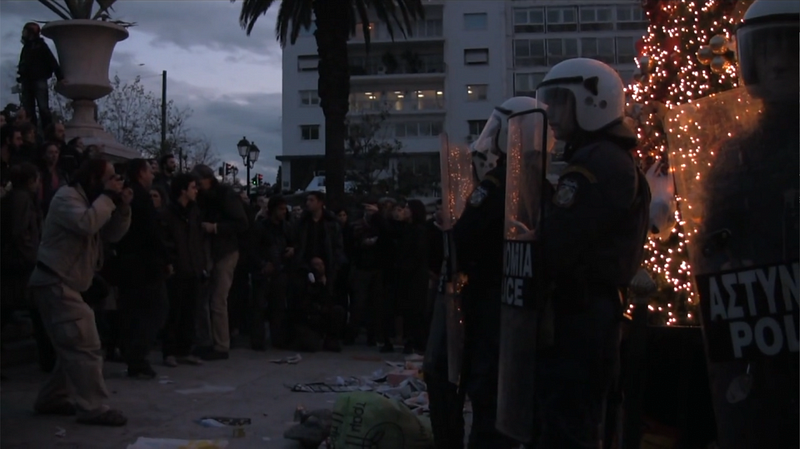
A film director’s discovery of America
Through the camera I attempted to understand America and familiarize myself with my new environment. I wanted to interact with my new surroundings and filmmaking was my way in. Los Angeles is so close to Mexico. Spanish is as common a language as English there and I found myself feeling very comfortable within the Mexican culture, maybe more comfortable than the Anglo-saxon one. I wanted the film to be set at America’s border with Mexico, even though I was warned that this was very dangerous. I also was aware that I was a newcomer and an outsider who had no choice but to film from a distance and this added for me a mythical dimension to the project. Although criminality rates were high, I was ignorant of the risks involved. I think my innocence kept me safe. It was the first film I sent to a festival.
The love for editing
Editing was my entry point into understanding directing and screenwriting. A great chapter in my life and in my development as a filmmaker has been collaborating with Panagiotis Evangelidis, whom I have known since my childhood. While I was studying cinema, he shot Chip & Ovi in Romania without even being certain if he would turn his material into a film.
I offered to do the editing because I was fascinated by the characters, but I didn’t know how to edit yet. I was motivated to learn so that I could take this on. Eventually I got an assistant director credit and, most importantly, I edited his subsequent films: The Life and Death of Celso Junior, They Glow in the Dark and Irving Park. What I find exciting about editing is that you can use it to write a story. It’s like writing a script with images. Especially when I work with other directors, getting inside the other person’s head and agreeing or disagreeing with their choices is revealing about your own directorial approach, especially in fiction. I like the process of collaboration and the different perspective someone else can bring to something you’ve thought of in a different way.
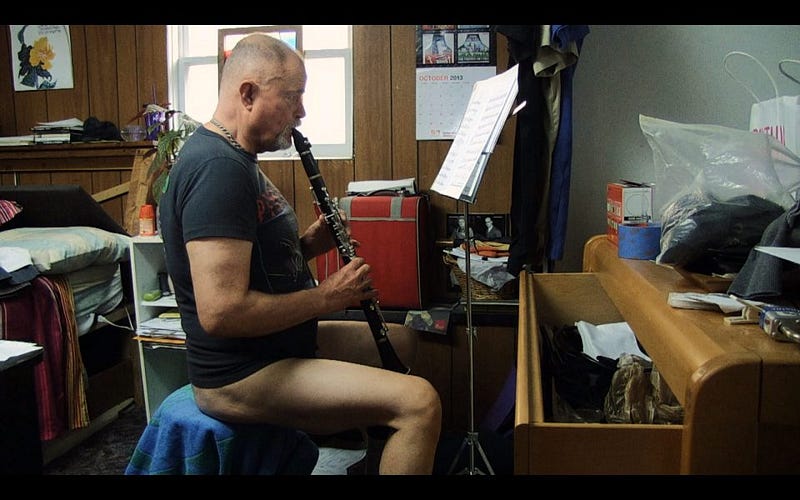
Holy Emy
Holy Emy was an adventure. My original inspiration came when I read Yuko Ogawa’s Pregnancy Diaries. I wanted to make a film about two sisters, one of whom is pregnant while the other one (the main character, Emy) is closely observing her. As the story evolved in my mind, it got enveloped with mystery and infused with a secret. When I decide to make a film, I want it to be the beginning of a journey for me. At first, I had a hard time finding what I wanted to film in Athens, a city I thought I knew well, since I wanted to be surprised, to be led to places I have never seen before. I was looking for ways for my hyper realistic story to feel grounded in reality and I decided to place it in the Filipino immigrant community in Athens. In a world like this, closed in on itself, there could very well exist a girl that is special and kept a secret. In the church, I discovered a whole new world, completely unfamiliar to me in a context I considered familiar. Then the script took a completely new turn and was enriched with my own personal experiences. I took a long time to develop the story together with my scriptwriter Giulia Caruso. It ended up being such a demanding film — involving amateur actors, special effects and locations — that I needed to go to the shoot with a very detailed and complete script, without room for improvisation. My cinematographer Ki Jin Kim and I saw the images we had in mind for a long time come to life exactly as we had pictured them. I wanted to make a fiction film that offered more than the richness of documentary, so we tried to use the camera to invent a new language that served the supernatural elements of the story.
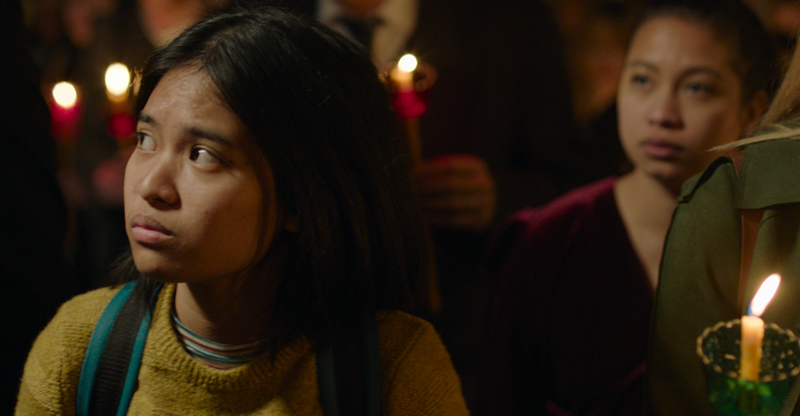
The risky venture of casting
Finding the right lead was key for the film. We started casting and auditions before securing financing because we knew it would take a long time to find Emy. I had been visiting the Filipino community for many years, but there was a very delicate balance, I couldn’t just start filming or doing auditions. I had to earn their trust and be discreet, I couldn’t impose my own story and reject the truth that I found there. But the whole community was tremendously generous with me and I enjoyed every moment, especially the parties they hold after the service. If we hadn’t found Abigael, we wouldn’t be able to make this film. There was even the thought of bringing in an actress from the Philippines, but that way the story would lose its way. Because that’s the whole point of the film, the extent — and ways — in which Emy has lost her connection to her homeland but a huge part of her heritage lives inside her.
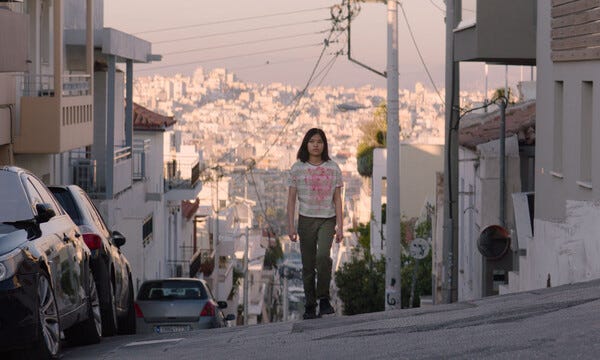
Multicultural Greece
Emy is a second-generation immigrant who was born and raised in this country. There is a misconception by a majority of Greeks that Greece consists only of white, Christian Greek natives but there is much more to it, rendering they country far more interesting. I am very interested in individuals who experience the clash of cultures within themselves and feel like they don’t belong or fit in anywhere. We all have a part of us that doesn’t belong.
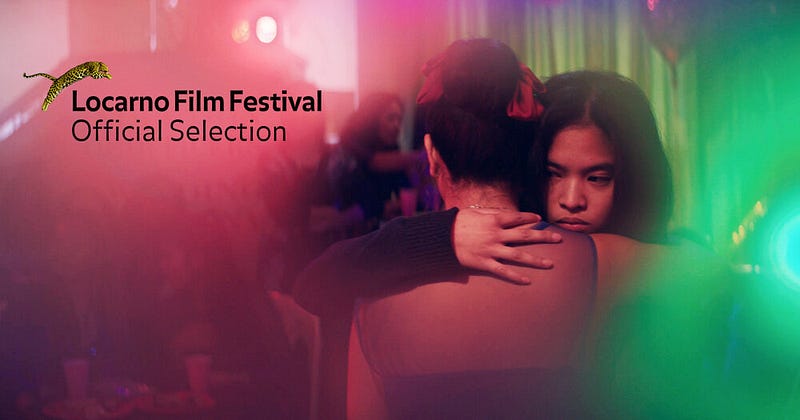
Embraced by the Locarno festival
Locarno is an iconic festival for me and I love many of the films that have been screened there. What pleased me the most was that the festival admitted my film into its universe, as Locarno embraces the most experimental and idiosyncratic aspects of contemporary cinema production. When you’re making a film as a new director, you don’t know where exactly your own vocabulary stands. This was a vindication for me, I felt welcomed by a world I’m happy to belong to.
Iris Award for Best Director
Being awarded the Hellenic Film Academy’s Best Director Award is a great honour, as you feel like you’ve earned the recognition of the people in your field — especially so when it’s for your first film. I was especially happy to receive the award from Panos Koutras and Konstantina Kotzamanis, whose work I have admired for years.
On the value of winning prizes
I don’t believe that awards add something to the film. There are films which are true gems and haven’t received any awards, they are completely unknown. The most important thing is to feel that your film is exactly how you imagined it. Winning awards is mainly helpful for future projects and for making your work more widely known, so it can be communicated to more people. It’s important that your film reaches the people you intend it for. It is very touching to have someone come up to you and say they appreciate something that had been brewing in your imagination for a long time.
The difficulties of the Greek film production sector
I belong to a new generation of filmmakers and, through this film, I’ve experienced first-hand the problems οf producing a film in Greece. One of the main reasons why Holy Emy took so long to complete was the financial crisis. It’s terribly stressful to have to wait and see how the limited available resources will end up being allocated, and how long this will take. In international co-productions there are timelines and strict deadlines and waiting to receive the support coming from the Centre can derail any project. In the past, less money was given to more productions and the red tape and time spent seeking funds from alternative sources was an exhausting process. Foreign colleagues and collaborators wonder how we can make films in Greece with such a small budgets. But maybe this unlocks our creativity and makes us more inventive.
Defying categorization
I do not determine in advance the form that each of my films will take, which genre it will belong to. Each stage of preparation is a point in time and only at the end can you go back and see the line linking them to each other. It is a common trait among critics to focus on some best-known creators when defining regional cinema. I don’t find this stifling. We all have common experiences and it’s interesting to see what has crept into our films or characters. As far as I’m concerned, I draw inspiration from my own experiences. An external observer could find more similarities and characteristics linking the films to each other.
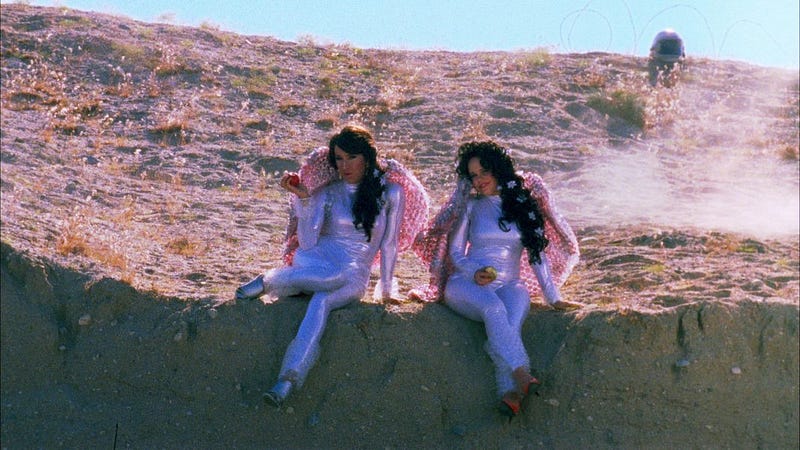
Female Gaze and redefining our way of seeing
I find it very refreshing that female filmmakers are interested in body horror and experimenting with genres, offering new perspectives and different sensibilities. For years we’ve been raised as viewers with a male directorial gaze and for some it’s hard to shed that mold still used to appreciate films. A new voice should be allowed space to express itself and you have to be open when discussing its specificity.
Araceli Lemos (SNF ARTWORKS Fellow 2019) is a Greek writer, director and editor born in Athens, Greece and currently based in Los Angeles. Her debut feature Holy Emy received a Special Mention Jury Award at Locarno 2021, and was released by MUBI. Araceli won Best Director at the 2022 Hellenic Film Academy Awards where Holy Emy received a leading 15 nominations.
Tassos Chatzieffraimidis is a lawyer and a freelance writer based in Athens. He currently works as a film curator at Cinobo, a digital platform dedicated to independent and arthouse cinema.



